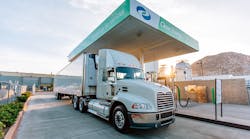Clean Energy Fuels Corp. has revealed new fuel, construction and service agreements as more fleets convert from diesel to Redeem renewable natural gas (RNG), a transportation fuel made from organic waste that not only addresses short-term air quality issues caused by diesel but is a carbon-neutral alternative that greatly reduces the amount of greenhouse gas produced by vehicles.
Clean Energy has begun a major fueling infrastructure upgrade for trucks operating in the Port of Los Angeles and Port of Long Beach. The upgrade will increase the availability of Redeem at the nation’s largest alternative fuel station in America’s largest port complex.
The first phase of the project, which has been completed, delivers renewable compressed natural gas (CNG) through six new dispensers. Phase two, which will install new compressors and associated equipment to improve the performance and efficiency of the station, is scheduled for summer 2020.
Clean Energy announced last week that trucking fleets that operate in the ports are taking delivery of additional clean heavy-duty trucks. The San Pedro Ports Clean Air Action Plan will start imposing a container rate, scheduled to start next year, on containers that are hauled by trucks that do not meet stricter emission standards.
The city of Ontario, CA, signed a five-year RNG supply contract for an approximate 3 million gallons of Redeem to reduce fleet emissions in accordance with the city’s sustainability goals. Ontario currently operates 88 CNG-powered vehicles, having recently purchased six new refuse trucks and the city’s first CNG-powered asphalt patch truck.
The City of Sacramento has signed a contract for an expected 650,000 gallons of Redeem to fuel about 100 solid waste vehicles. Likewise, the County of Sacramento inked a deal for 550,000 gallons of RNG to fuel about 100 vehicles.
Ruan Transportation Management Systems, a nationwide provider, has signed a three-year contract for an approximate 450,000 gallons of Redeem to fuel an additional 20 CNG tractors for its dairy operations. Ruan is deploying trucks with new ultralow-NOx Cummins Westport engines with funding from California’s HVIP program, which provides incentives for cleaner and more efficient near-zero vehicles.
MDB Trucking has signed a two-year fuel agreement for an anticipated 360,000 gallons of Redeem to fuel 24 additional CNG trucks at its Port of Long Beach operation. In addition to a positive experience with natural gas tractors, the postal company is expanding its use of natural gas vehicles to support sustainability initiatives in the region.
Long-time Clean Energy customer, City of Commerce of California has extended its operations and maintenance agreement for six years. The public station dispenses an estimated 12 million gallons of Redeem to fuel 25 city vehicles, as well as commercial trucks and buses. The city has also received $1.1 million in grant funding to expand and upgrade the station.
OmniTrans, which provides bus and rail service in San Bernardino, CA, has signed a five-year operations and maintenance agreement for two CNG stations that dispense an approximate 4 million gallons per year to fuel 237 municipal transit buses.
“It’s encouraging that more fleets are choosing to fuel with Redeem because as a diesel fuel alternative it reduces greenhouse gas emissions which can improve air quality and positively impact public health,” said Chad Lindholm, vice president at Clean Energy Fuels. “We will continue to expand the RNG fueling infrastructure to ensure that Redeem is readily available to meet the growing demand.”
One of the fastest growing companies in GFL Environmental (GFL) in Denver, CO, has inked a 10-year station upgrade and maintenance agreement.
Clean Energy has worked closely with GFL and constructed its original CNG station in 2011. The station currently supports approximately 50 CNG refuse trucks but will be expanded to support over 80 CNG trucks. With a strong focus on sustainability, GFL plans to have 70 CNG trucks in operation by the end of 2020.
The Kansas City region remains committed to displacing diesel fuel with cleaner-burning CNG. Recent vehicle replacements by the City of Kansas City, MO and the Kansas City Area Transportation Authority (KCATA) will displace an anticipated 5 million total gallons of diesel over the life of the vehicles.
The KCATA has a total of 128 CNG buses in its fleet. Of those, 94 have been put in service in the last 24 months. Clean Energy continues to support the missions of both organizations by providing ongoing operation and maintenance of their Clean Energy-constructed CNG fueling stations.
“The City of Kansas City has a long history of green initiatives and we remain committed to deploying alternative fuel vehicles when it makes economic and environmental sense for the community,” said Dan Williams, fleet asset manager of the City of Kansas City. “In many of our vocational and public service applications, compressed natural gas allows us to meet both of those requirements.”



